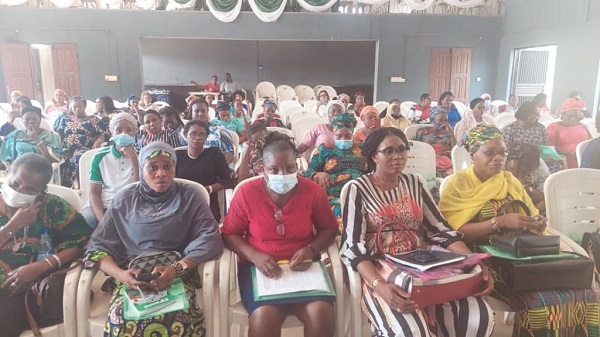
The Minister of Agriculture and Rural Development, Dr. Mohammad Abubakar, has advocated the promotion of gender mainstreaming into climate change ‘mitigation and adaptation strategies for women farmers.
The minister stated this during a workshop on “Gender Mainstreaming into Climate Change; Mitigation and Adaptation Strategies for Women Farmers” in the southwest zone in Ibadan, Oyo State.
Represented by the state director, Mrs. Oguntuyi-Abimbola Folashade, Abubakar said the effort will increase the productivity of both men and women farmers across the food value chain.
He reiterated the ministry’s commitment to gender mainstreaming at all levels of the agricultural sector, stating that it is a tool for achieving gender-based reforms and increasing productivity by men and women along all the food value chains.
“Nigeria’s agricultural sector is most vulnerable and susceptible to the impacts of climate change. The reason for this cannot be far-fetched because it is rain-dependent. Any change in the weather pattern – the amount of rain/sun, intensity, duration and the on-set – affects the farmers’ decisions on when, what and which crop to cultivate. Climate change and variability affect women particularly, seeing as they constitute the most vulnerable of the farming communities,” he stated.
The minister further highlighted that the statistics indicate that small-holder farms managed by women constitute about 80 per cent of the labour force involved in agricultural production and grow the bulk of the food for domestic consumption in Nigeria. Overall, they constitute about 43 per cent of the agricultural labour force in developing countries.
According to him, adequate provisions have been made to address the various challenges and needs faced by women farmers especially in the area of climate change, access to inputs including credit, as well as information and technologies, climate change adaptation and mitigation strategies that would help to build and enhance their resilience to threats of climate in agricultural production.
“The choice of Oyo as one of the states in the series of outlined workshops is because the state is one of the frontline states within the country’s agro-ecological zones vulnerable to the impact of climate change. The National Gender Policy in Agriculture was approved in 2019 with the thrust hinged on gender equity and equality for optimum productivity in the agricultural sector.
“Our planet is changing before our eyes and getting warm faster, parts of the Amazon rainforest now emit more carbon than they absorb, the world is being polluted at an alarming rate, [with] nearly 4 billion people suffering climate-related disaster. We must do more to protect vulnerable communities from clear and present dangers of climate change.
“Climate change mitigation means avoiding and reducing the emission of heat-trapping greenhouse gases into the atmosphere to prevent the planet from warming to more extreme temperatures. Climate change adaptation refers to the altering of our behaviour, systems and, in some cases, ways of life to protect our families, our economies and the environment in which we live from the impacts of climate change,” the minister explained.
In his welcome address the commissioner, Oyo State Ministry of Agriculture, Hon. Adeniyi Adebisi, represented by the director of agricultural extension and rural development, Mrs. Iroko Ibwaumolara, said the training will open the eyes of our women to climate change causes and adaptation strategies.
He added that the agricultural sector is mostly hit by the effect of climate change whereby farmers experience floods and drought, leading to loss of crops, earth-warming leading to dangerous animals leaving their natural abode to enter villages, rainfall is no longer predictable, leading to livelihood challenges and, as such, different types of conflicts are experienced leading to instability and insecurity.
A statement by the ministry’s director of information signed by Mohammed Abdullahi Gana said: “Mitigating climate change has become Imperative for all strata of the society to focus on, to enable people to live in a better world and able to have access to abundant food. There is the need to drastically reduce toxic gasses going to the atmosphere, plant trees, plant/raise drought-tolerant varieties of crops and livestock”.
He added that the Oyo State governor, Engr. Oluseyi Abiodun Makinde is committed to solving the challenges of women smallholder farmers in the state.
Earlier in her opening remarks, the head, gender unit, department of special duties, FMARD, Mrs. Ifeoma Anyanwu, said that the National Gender Policy in Agriculture was made public in 2019, with 11 objectives to reduce the vulnerability of women in the agricultural sector.


